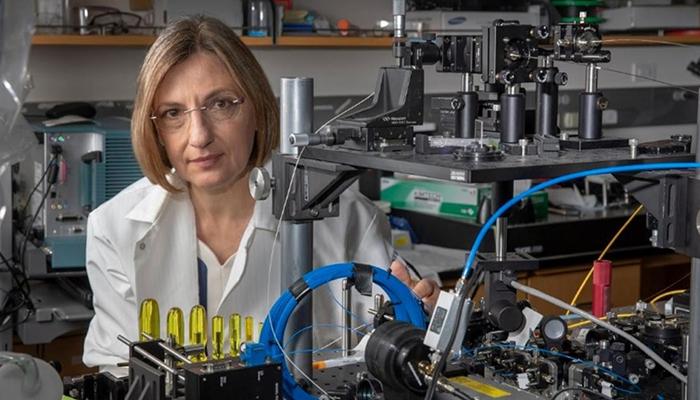Seed funding from UC Davis IMPACT center will go toward high-impact, multidisciplinary research

Credit: UC Davis
The UC Davis Center for Data Science and Artificial Intelligence Research (CeDAR) has awarded over $1 million dollars in grants to 18 campus researchers studying innovative data science.
“Data science and artificial intelligence are playing an increasingly important and expansive role in the world today, including the rapid advancement in key research fields like healthcare, agriculture, environment and bioengineering,” said Thomas Strohmer, director for CeDAR and a professor in the UC Davis Department of Mathematics. “That’s why the award recipients are in so many fields of research.”
CeDAR, one of four IMPACT Centers launched last fall by the UC Davis Office of Research, has the primary mission of fostering innovative and groundbreaking multidisciplinary research in data science, with a particular interest in funding innovative concepts that promised high reward and high impact.
The main objective of these grants–the first to be awarded by CeDAR–is to create strategic research partnerships across all disciplines on campus engaging in data science research. Grants awarded ranged from $40,000 to $100,000.
All submitted proposals went through a rigorous review process by a panel of UC Davis faculty with relevant experience. Proposal evaluators gave strong preference to projects that created new collaborative and interdisciplinary teams, presented innovative areas for focus and showed potential for significant societal impact.
Two of the research projects focus on the coronavirus pandemic: Democratizing Health Research Through Privacy-Protecting Synthetic Data, led by Strohmer, and Using Data Science to Address the COVID-19 Pandemic, led by Francisco Arsuaga, a professor in the departments of Mathematics and Cellular and Molecular Biology.
All senior investigators involved in each of the awarded proposals will become CeDAR affiliate members, expanding the growing network of interdisciplinary researchers at UC Davis applying their expertise and energy to the advancement of data science applications.
The awards:
- Using Data Science to Address the COVID-19 Pandemic
Francisco Arsuaga, professor, Molecular and Cellular Biology, Mathematics - Fine-Grained Uncertainty Quantification of Predictive Algorithms for Healthcare Systems
Krishnakumar Balasubramanian, assistant professor, Statistics - Machine Learning Assisted Sampling and Patient Classification to Eliminate Paralyzing Bottlenecks in a High-Throughput Raman Spectroscopy Platform for Cancer Liquid Biopsy
Randy Carney, assistant professor, Biomedical Engineering - Natural Artificial Intelligence at the Onset of Chaos
James Crutchfield, distinguished professor, Physics - Low-cost, Data-Efficient AI-Enabled Sensing Kits for Grape Production
Mason Earles, assistant professor, Biological and Agricultural Engineering - An Integrative Data Science Approach for Agricultural and Environmental Sciences: Harnessing Remote Sensing Data for California’s Agriculture
Dalia Ghanem, assistant professor, Agricultural and Resource Economics - Needle in Haystack: Fetal Signal Isolation for Transabdominal Fetal Pulse Oximetry
Soheil Ghiasi, professor, Electrical and Computer Engineering - Rapid Quantification of Forest Fuels for Wildfire Risk Mitigation Using Computer Vision
Andrew Latimer, professor, Plant Sciences - Nonsmooth Riemannian Optimization for Online Learning
Shiqian Ma, associate professor, Mathematics - A Model-Data Fusion Approach to Quantify and Predict the Fate of Terrestrial Carbon in California
Troy Magney, assistant professor, Plant Sciences - Artificial Intelligence in Surgical Oncology
Laura Marcu, professor, Biomedical Engineering - A General Neural Attention Model for Multi-Instance Learning and Microbial Food Safety
Gerald Quon, assistant professor, Molecular and Cellular Biology - Data Science Challenges in Large-Scale Light Microscopy Imaging with Applications to Neuroimmunology
Colin Reardon, assistant professor, Anatomy, Physiology and Cell Biology, School of Veterinary Medicine - Bright Spots and Blind Spots: Can Big Data Improve Water Research in Latin America?
Samuel Sandoval Solis, associate professor, Land, Air and Water Resources - Flood Risk and the Insurance Coverage Gap
Michael Springborn, associate professor, Environmental Science and Policy v - Democratizing Health Research Through Privacy-Protecting Synthetic Data
Thomas Strohmer, professor, Mathematics - Development of a Machine Learning Algorithm to Improve Computational Efficiency of Atmospheric Chemistry
Anthony Wexler, distinguished professor, Mechanical and Aerospace Engineering, Civil and Environmental Engineering, Land, Air and Water Resources - AI in Clinical Decision Making for Veterinary Medicine
Allison Zwingenberger, professor, Surgical and Radiological Sciences, School of Veterinary Medicine
All projects will receive funding for a duration of 12 to 24 months and each team will be presenting their research and findings at future CeDAR events throughout that time. All teams will also be participating in CeDAR activities for data science research, education and community building.
“I would like to congratulate all of the recipients and look forward to seeing the outcome of their innovative work,” said Prasant Mohapatra, vice chancellor for research at UC Davis. “CeDAR’s grant program illustrates the intent of our IMPACT Centers, to stimulate innovative interdisciplinary research that responds to society’s greatest challenges.”
###
Media Contact
Andy Fell
[email protected]
Original Source
https:/




